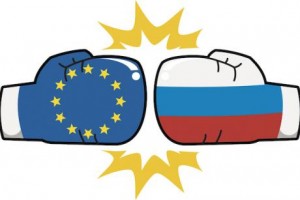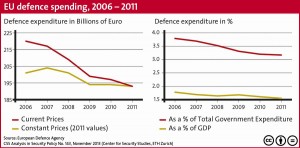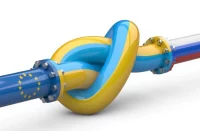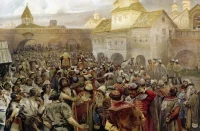Well, you can in Russian. But I still like my title.
In this paper I want to turn to the question of Russia-EU relations for the foreseeable future, touching in outline on their deterioration, the causes for that deterioration and finally the primary obstacle to amending them on the European side.
1
2014 was a sad year. The Civil War in the Don was coupled with the complete break-down of Russian and European relations and cooperation culminating in the sanctions war. This gains in tragedy as relations had not been better since perhaps before the First World War. Russians and Europeans are deeply integrated because of both migration and tourism. Add to that international students and common media—a stand-off between governments is immensely unwelcome on both sides.
On the European end, analysts and politicians have frequently cited the word “values” to justify their stance against the Russian Federation. The situation thereby becomes tragi-comic, as Russia almost alone promotes and defends traditional Christian European values.
Then there is the business end of it. It has to be said here that on the Russian side, it’s been a gentle sting. Prices of products did not appreciably increase. Most people’s wages remained constant. And the ruble was almost unaffected before the price of oil went down.
 In point of fact, the sanctions were treated as a business opportunity. Between Russia and the EU, it’s much like the difference between shopping and sales work. New companies from developing countries—leaving to one side the economic giant China—were extremely eager to get into the Russian market. Russia had only to pick which. It’s not so easy to find another viable buyer.
In point of fact, the sanctions were treated as a business opportunity. Between Russia and the EU, it’s much like the difference between shopping and sales work. New companies from developing countries—leaving to one side the economic giant China—were extremely eager to get into the Russian market. Russia had only to pick which. It’s not so easy to find another viable buyer.
If the purpose of the sanctions was to isolate the Russian Federation, they’ve had the exact opposite effect. Russia’s imports have never been so international.
No color revolution is forthcoming. Putin’s popularity soared in step with the measures taken by the US and EU against the Russian Federation. Civic pride has not been so high since the Tsars. Санкции? Не смешите мой Искандеры!
This has doubtlessly been a trial of fire for the Russian economy, but one which it has passed in spectacular form. Phasing out the USD together with China and lightening its dollar reserves by buying up gold, coming up with an internal system that undercuts the threat to cut Russia off from SWIFT, the stabilization of the ruble after the fall in oil-prices, using its very weakness to draw investments. Economists are beginning to tip their hats toward Russia for its almost professional handling of the concerted attempt at exploding its economy.
2
The European end? First, there are member States whose whole economies are geared to the Russian market. Much of their exports were perishable and so went to waste as no new buyer could be found in time. Much of it too is the kind of thing only Russians would buy. Swedes don’t eat that, Americans don’t drink this. There is no alternative market.
That goes not only for food and drinks, but for specialized equipment suited to oil-extraction in the uniquely difficult Russian terrain. Germany in this regard was hurt most. German business had good reason to complain, and complain the German Committee on Eastern European Economic Relations did. In 2013 German exports to the Russian market made up about 30% of the EU’s total (= €36 billion). There are over 6,000 German firms with investments tallying to something like €20 billion inside the Russian Federation.
The other big member States were in no better position to be imposing sanctions on anyone. For 2013, only by taking the UK collectively without singling out the member States that compromise it could any of them be said to have put up significant GDP growth.
France has repeatedly failed to reach the economic performance upon which their EU membership is conditional and her GDP growth was a dismal 0.2%. Italy managed to do worse with -1.9%. And with the other members taken together at 0.1%—one can only wonder what they were thinking. *Note: all figures were taken from RD’s dossier “Why the G20 Still Matters for Russia”*
Well, let’s wonder. Why would the biggest trade power in the world, with a market of 500 million people and the most deeply integrated economic space ever, why would they act in such a way so contrary to their national interests individually and to their economic project as a whole?
3
America locuta est. Causa finita est
The United States has spoken. The matter is settled.
The above sentence says it all. But let’s draw out what it amounts to plainly.
Why does the EU listen to and march in lock-step with the US? Values, values, values. They say it so much! But it’s really a pretty mask for an ugly face. The truth behind it is a total dependency on the US in defence and security.
After the Great Patriotic War and the dissolution of the USSR the US became the protectorate of the places that make up the modern EU. In the case of Germany, there was even a legal limitation on the extent to which they could independently pursue national defence.
 The EU spends €12 billion annually on external relations. Contrast that with €400 million on defence and security. It’s only as late as December 2013, after years of slashing away at the already emaciated defence budget, that the European Council has begun to reconsider its policy. “Defence Matters” was the catch-phrase and indeed it does. In 2015 they have talked defence some more and intend to monitor and regularly update their approach throughout this year.
The EU spends €12 billion annually on external relations. Contrast that with €400 million on defence and security. It’s only as late as December 2013, after years of slashing away at the already emaciated defence budget, that the European Council has begun to reconsider its policy. “Defence Matters” was the catch-phrase and indeed it does. In 2015 they have talked defence some more and intend to monitor and regularly update their approach throughout this year.
But this is where we stand. Since the collapse of the USSR the US has kept Europe completely incapable of defending itself and made it afraid of Russia to justify its comically transparent excesses in missile and troop placement in the region.
Conclusion
The solution? Europe needs a backbone.
Europe can’t say no to the United States. It can’t say no because it needs the United States for regional security and defence. Countries with practically no real defence force to speak of and more importantly: to defend them, are bound to obey their protector. This is why the EU apes America. This is why they will act in deliberate opposition to their own national interests. This is why the reset with the Russian Federation has been successfully sabotaged.
Is there promise? Hope? Even a glimmer? Can Europe stand again on its own feet?
For all the talk of defence, sadly it looks like there is not.
In the first place, as with everything in the EU, it is all acronyms (CSDP, ect.) and needlessly complicated talk. Action rarely follows.
Secondly, the emphasis is on industry (EDTIB) and foreign intervention (EUFOR RCA, EUAM, EUCAP SAHEL)—and not on home security and national defence capability. This is the next to last concern in the Council’s most recent summary of its activity.
Finally, it is unclear whether it’s even structurally possible for the EU to bring its defence and security up to a standard that would make US support unnecessary. The only world in which this would be possible is one where the EU cooperates with the nearest major military power: the Russian Federation.
And we all know how likely that is. . .
But if only for regional proximity, Russia and the EU must cooperate in some meaningful sense. There are already signs that things are getting better. Relations with Germany are promising, if you look at them the right way. France might turn right. Except Poland, the Visegrad group has been uniformly against sanctions, as has Greece. Counter-terrorism is taking on an increasingly insistent tone—it’s not an area that permits countries to insulate themselves from valuable allies.
It may be some time before relations return to their previous openness and become as good as they were before, but it remains a fact above any questioning—from Lisbon to Vladivostok: everybody needs everyone.














Pingback: You Can’t Spell Future without an E and a U… | Protestation
This assumes that countries are the highest form that matters. One could make the case that financial and business cartels are higher, so the Western bankster cabal has sufficient influence in both DC and Brussels to pursue certain policies. Whether France benefits is immaterial. France is under the EU and the EU is under the Western financial oligarchy, which dominates all the major businesses as well.